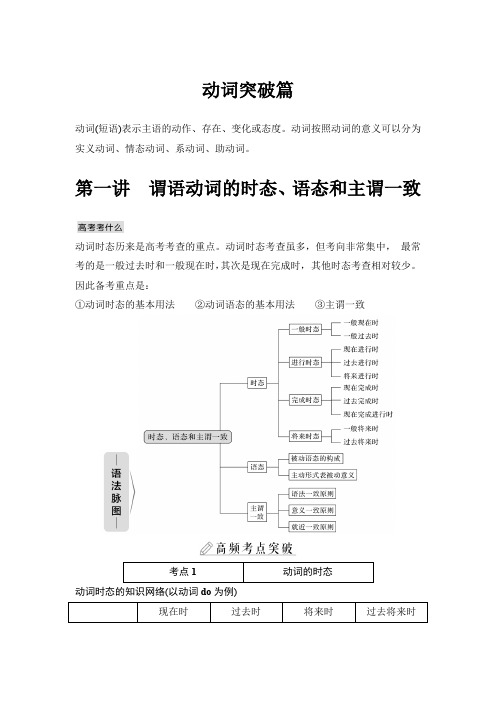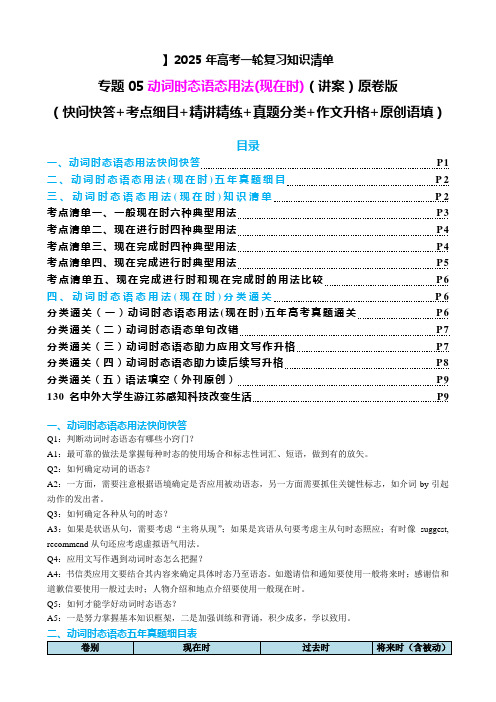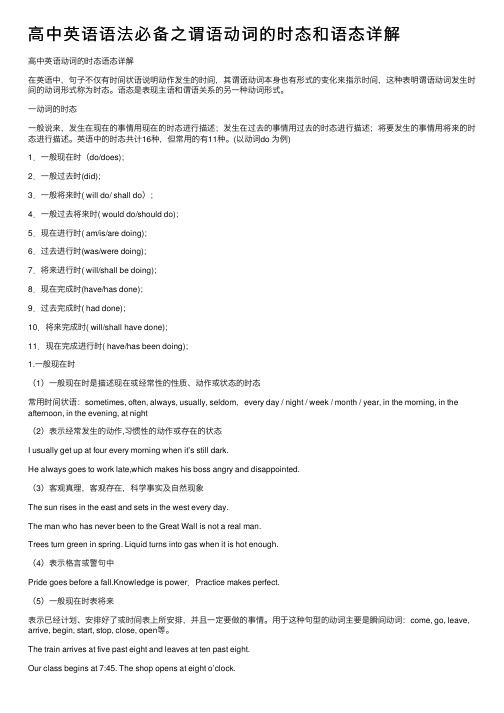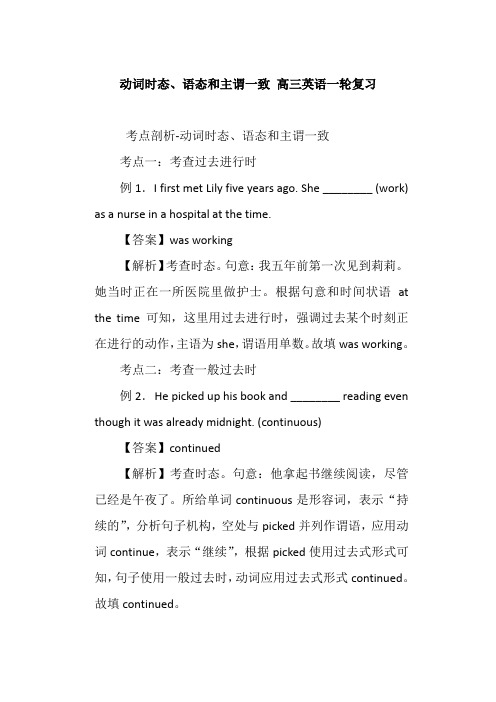(完整word版)高中英语动词时态语态复习讲解
高中英语动词时态语态考点详解版

表格式一般现在时态和语态2. Jenny (has) a good friend?3. Brian (not live) in China.4. Li Ming with me (be) in Beijing.5. If it (not rain)tomorrow, we will go to the park.6. Our teacher said that the earth (go)around the sun yesterday.7.He (help)the old man every week .8.The old man (help)by him every week.9.The building (visit) by many people every year.一一般现在时(一)定义:主要用来表示人、事物的现在状况和特点;表示经常或习惯性的动作,句子中常有often, always, from time to time 等时间状语;表示客观规律和永恒真理等He usually goes to work at 7 o’clock every morning. The earth goes around the sun. Guangzhou is situated in the south of China.(二)标志词:always, usually, often, sometimes, hardly ever,every week (day, year, month…),once /twice a week, on Sundays,(三)谓语动词构成:1 be动词的一般现在时:am is are("是",“在”)2 当谓语动词是行为动词的时候:(1)当主语不是第三人称单数的时候,一般现在时用行为动词的原形(2)主语是he,she,it等第三人称单数(除去I,you以外的任何一个单数的名词或者代词),动词要变形加s或es.(温馨提示:动词变形要符合两个条件:1,主语是三单,2,句子是肯定句)(四).基本结构:1,肯定句:主语+谓语(+其他的)He loves sports. Jane is an outgoing girl.(主语He是三单,又是肯定句,所以谓语动词发生变形,加上了s)Tom and Tim both have medium height.He has a big mouth. We like the dog very much.2,否定句:主语+don’t或者doesn’t+动词原形+其他(在be或者后面加上do does) Candy doesn’t do her housework every day. We don’t dance .He isn’t a worker.3,一般疑问句:Do (Does)+主语+动词原形+其他?(把be或者do does 提到主语的前面)Does she like English? Yes,she does. No,she doesn’t.Do you swim in summer? Are you a teacher?4,特殊疑问句:疑问词+一般疑问句Where does Tom come from?(五) 一般现在时态用法(1)经常性或习惯性的动作,常与这样的时间状语连用:eg: We always help each other. It often snows in winter. I get up early every morning.(2)表示主语现在的特征、性格、能力等。
【高考英语一轮复习】第一讲 谓语动词的时态、语态和主谓一致

动词突破篇动词(短语)表示主语的动作、存在、变化或态度。
动词按照动词的意义可以分为实义动词、情态动词、系动词、助动词。
第一讲谓语动词的时态、语态和主谓一致动词时态历来是高考考查的重点。
动词时态考查虽多,但考向非常集中,最常考的是一般过去时和一般现在时,其次是现在完成时,其他时态考查相对较少。
因此备考重点是:①动词时态的基本用法②动词语态的基本用法③主谓一致动词时态的知识网络(以动词do为例)1.一般时态(1)一般现在时①表示经常或习惯性的动作,多用动作动词,且常与表频率的时间状语连用。
We have meals three times a day.我们一日吃三餐。
②表示客观真理、科学事实及自然现象。
The sun sets in the west.太阳从西方落下。
③在时间、条件状语从句中常用一般现在时代替一般将来时。
I’ll write to her when I have time.有时间我会写信给她。
(2)一般过去时①表示过去发生的一次性或习惯性动作或状态。
We often played basketball together.我们(过去)经常在一起打篮球。
②时间、条件、让步状语从句中,若主句用了过去将来时,从句常用一般过去时。
He said he would tell her the news as soon as he met her.他说他一见到她就把这个消息告诉她。
单句语法填空①The 80,000 objects collected by Sir Hans Sloane, for example, formed (form) the core collection of the British Museum which/that opened in 1759.(2020·新高考卷Ⅰ语法填空)②The unmanned Chang’e-4 probe (探测器)—the name was inspired by an ancient Chinese moon goddess—touched (touch) down last week in the South Pole-Aitken basin.(2020·全国卷Ⅰ语法填空)③When/As he asked the villagers on the banks of the river where he could find the legendary (传奇的) artist, they smiled and pointed (point) down the river.(2020·全国卷Ⅲ语法填空)④New methods meant__(mean)that fewer people worked in farming.(2020·浙江卷语法填空)⑤While running regularly can’t make you live forever,the review says it is(be) more effective at lengthening life than walking,cycling or swimming.(2018·全国卷Ⅰ语法填空)⑥Sarah says,“My dad thinks I should take the offer now.But at the moment,school comes (come) first.I don’t want to get too absorbed in modeling.”(全国卷Ⅲ语法填空)2.进行时态(1)现在进行时(am/is/are+现在分词)①表示说话时正在进行或发生的动作,也可表示现阶段正在进行的动作或存在的状态。
专题05 动词时态语态(现在时)(讲案)-2025年高考英语一轮复习知识清单(全国通用)含解析

】2025年高考一轮复习知识清单专题05动词时态语态用法(现在时)(讲案)原卷版(快问快答+考点细目+精讲精练+真题分类+作文升格+原创语填)目录一、动词时态语态用法快问快答P1二、动词时态语态用法(现在时)五年真题细目P2三、动词时态语态用法(现在时)知识清单P2 考点清单一、一般现在时六种典型用法P3 考点清单二、现在进行时四种典型用法P4 考点清单三、现在完成时四种典型用法P4 考点清单四、现在完成进行时典型用法P5 考点清单五、现在完成进行时和现在完成时的用法比较P6 四、动词时态语态用法(现在时)分类通关P6 分类通关(一)动词时态语态用法(现在时)五年高考真题通关P6 分类通关(二)动词时态语态单句改错P7 分类通关(三)动词时态语态助力应用文写作升格P7 分类通关(四)动词时态语态助力读后续写升格P8 分类通关(五)语法填空(外刊原创)P9 130名中外大学生游江苏感知科技改变生活P9一、动词时态语态用法快问快答Q1:判断动词时态语态有哪些小窍门?A1:最可靠的做法是掌握每种时态的使用场合和标志性词汇、短语,做到有的放矢。
Q2:如何确定动词的语态?A2:一方面,需要注意根据语境确定是否应用被动语态,另一方面需要抓住关键性标志,如介词by引起动作的发出者。
Q3:如何确定各种从句的时态?A3:如果是状语从句,需要考虑“主将从现”;如果是宾语从句要考虑主从句时态照应;有时像suggest, recommend从句还应考虑虚拟语气用法。
Q4:应用文写作遇到动词时态怎么把握?A4:书信类应用文要结合其内容来确定具体时态乃至语态。
如邀请信和通知要使用一般将来时;感谢信和道歉信要使用一般过去时;人物介绍和地点介绍要使用一般现在时。
Q5:如何才能学好动词时态语态?A5:一是努力掌握基本知识框架,二是加强训练和背诵,积少成多,学以致用。
三、动词时态语态用法(现在时)知识清单考点清单一、一般现在时六种典型用法【即时训练】在空白处填入括号内单词的正确形式。
高中英语语法必备之谓语动词的时态和语态详解

⾼中英语语法必备之谓语动词的时态和语态详解⾼中英语动词的时态语态详解在英语中,句⼦不仅有时间状语说明动作发⽣的时间,其谓语动词本⾝也有形式的变化来指⽰时间,这种表明谓语动词发⽣时间的动词形式称为时态。
语态是表现主语和谓语关系的另⼀种动词形式。
⼀动词的时态⼀般说来,发⽣在现在的事情⽤现在的时态进⾏描述;发⽣在过去的事情⽤过去的时态进⾏描述;将要发⽣的事情⽤将来的时态进⾏描述。
英语中的时态共计16种,但常⽤的有11种。
(以动词do 为例)1.⼀般现在时(do/does);2.⼀般过去时(did);3.⼀般将来时( will do/ shall do);4.⼀般过去将来时( would do/should do);5.现在进⾏时( am/is/are doing);6.过去进⾏时(was/were doing);7.将来进⾏时( will/shall be doing);8.现在完成时(have/has done);9.过去完成时( had done);10.将来完成时( will/shall have done);11.现在完成进⾏时( have/has been doing);1.⼀般现在时(1)⼀般现在时是描述现在或经常性的性质、动作或状态的时态常⽤时间状语:sometimes, often, always, usually, seldom,every day / night / week / month / year, in the morning, in the afternoon, in the evening, at night(2)表⽰经常发⽣的动作,习惯性的动作或存在的状态I usually get up at four every morning when it’s still dark.He always goes to work late,which makes his boss angry and disappointed.(3)客观真理,客观存在,科学事实及⾃然现象The sun rises in the east and sets in the west every day.The man who has never been to the Great Wall is not a real man.Trees turn green in spring. Liquid turns into gas when it is hot enough.(4)表⽰格⾔或警句中Pride goes before a fall.Knowledge is power.Practice makes perfect.(5)⼀般现在时表将来表⽰已经计划、安排好了或时间表上所安排,并且⼀定要做的事情。
完整版高考英语动词时态和语态讲解

时态语态〔一〕一般在表示:1.在的常性、性作 eg:IreadEnglisheverymorning.2.客真理、普遍公立、科学事eg:Thesunrisesintheeast.3.有的趣、好或能力eg:Helikesplayingfootball.4.存的性、特征或状eg:Thesituationisencouraging.5.介故事情、新eg:Workersfacetoughtimesabroad.6.按刻表或按定划、安排将要放生的作〔常如:come,go,leave,arrive,begin,start,takeoff,return,stop,open,close等〕eg:Thetrainleavesat4:30p.m.注意:here,there,now,then等开的倒装句要用一般在代替在行。
如:Look!Herecomesthebus.一般去表示:1.去常性、性的作或状eg:Heoftencriedwhenhewasaboy.2.去某的状或作eg:Iwenttothebankjustnow.3.用于Ididn’tknow⋯或Iforgot⋯,表示不知道或不得,但在道或得的事情。
eg:Ididn’tknowyouwerehere.Sorry,Iforgottobringmybook.注意:表示去常生的作,也可以用“usedtodo⋯〞和“woulddo〞一般将来表示: 1.在看来以后要生的作或存在的状eg:Tomwillcomenextweek.2.事物的固有属性或必然eg:Oilwillfloatinwater. Fishwilldiewithoutwater.3.将来某个作的安排、划eg:HeisgoingtospeakonTVthisevening.注意:将来常表达形式:will/shalldo;begoingtodo;betodo;beabouttodo 〔此形式不能与状用〕在行表示: 1.此此刻正在生的作eg:I’mstudyingEnglishnow.2.段正在生的作eg:Wearebuildingoursocialism.3.情况的性eg:Idon’treallyworkhere.Iamjusthelpinguntilthesecretaryarrives.4.与always,forever,constantly,continually 用,表示参上或等感情色彩,但并非作正在行eg:Heisalwayshelpingothers. Sheisalwaysforgettingsomething.5.按划、安排近期生的作〔只限于come,go,leave,arrive,start,move,sail,fly,travel,stay等〕eg:Aforeigneriscomingtovisitourschool. I’mleavingforBeijingtomorrow.注意:不宜用行的作:感:look,smell,feel,sound,taste,see,hear情感:like,love,prefer,admire, hate,fear 心:wish,hope,expect,want,need,believe,thin,understand,agree,know,remember,forget 所有:have,contain,won,hold,belongto去行表示: 1.去某一刻或段生的作eg:HewaswatchingTVthistimeyesterday.2.与always,forever,constantly,continually 用,表示或无等感情色彩eg:ComradeLei Fengwasalwaysthinkingofothersneverthinkingofhimself.3.去划、安排好的将来作〔只限于come,go,leave,arrive,start,move,sail,fly,travel,stay等〕eg:Hesaidhewasleavingthenextday. Iwastoldthetrainwasstartingsoon.注意:去行可用来描故事生的背景,如:Thewindwasblowinganditwasraininghard.去将来表示: 1.去某一刻后将要生的去作或去的意、打算〔主要用于从句中〕eg:She wassureshewouldsucceed. Ithoughtyouwouldcome.注意:把一般将来中的助成去式,便成了去将来的表达形式在完成表示: 1.在已完成或完成且在有影响的作eg:Ihavefinishedmyhomework.2.表示始于去持至今的作或状eg:He’slivedher esince2005. I’vetaughtEnglishfor15years.3.到目前止的一段内,多少次或第几次做某事eg:He’sbeentoBeijing severaltimes.It’sthethirdtimethatI’veseenthefilm.4.将来某将要做完的作〔限于和条件状从句〕eg:Don’tgetoffthebusuntilithas stopped.5.生在去的,但已成在的或eg:We’veallplayedwithsnowandice.注意:没有包括“在〞在内或不是截止到“在〞止的状不能与在完成用。
动词时态、语态和主谓一致+讲义-2024届高三英语一轮复习

动词时态、语态和主谓一致高三英语一轮复习考点剖析-动词时态、语态和主谓一致考点一:考查过去进行时例1.I first met Lily five years ago. She ________ (work) as a nurse in a hospital at the time.【答案】was working【解析】考查时态。
句意:我五年前第一次见到莉莉。
她当时正在一所医院里做护士。
根据句意和时间状语at the time 可知,这里用过去进行时,强调过去某个时刻正在进行的动作,主语为she,谓语用单数。
故填was working。
考点二:考查一般过去时例2.He picked up his book and ________ reading even though it was already midnight. (continuous)【答案】continued【解析】考查时态。
句意:他拿起书继续阅读,尽管已经是午夜了。
所给单词continuous是形容词,表示“持续的”,分析句子机构,空处与picked并列作谓语,应用动词continue,表示“继续”,根据picked使用过去式形式可知,句子使用一般过去时,动词应用过去式形式continued。
故填continued。
考点三:考查现在进行时例3.—Hi, Jessy. Why are you going to work on foot today?—Well, my car ________. (repair)【答案】is being repaired【解析】考查时态和语态。
句意:——你好,杰西。
你今天为什么要步行去上班?——嗯,我的车正在修理。
根据句意提到步行上班可知,此处表示:车在修理中,时态用现在进行时,主语my car与repair(修理)之间为被动关系,所以用现在进行时的被动语态。
主语my car为单数,be动词用is。
考点四:考查现在完成时例4.The city ________ (recognize) as the musical capital of Europe since the 16th century, home to the likes of Mozart and Beethoven.【答案】has been recognized【解析】考查时态语态。
高考英语考点精析复习讲义-时态和语态

第六讲时态和语态典型例题1.高考考查的八种动词时态是:一般现在时,一般过去时,一般将来时,现在进行时,过去进行时,现在完成时,过去完成时,过去将来时。
2.考生要学会在具体语言环境下使用具体时态的能力,从NMET对动词时态的考查来看,这几年试题的灵活性正逐步加强。
题干中的有效信息由“外显的”转向“隐蔽的”,情景中可能不出现明显的时间信息。
3.预计动词时态的考核有如下趋势:经常考查时态的基本知识点,考查时注重在实际场合中的交际应用。
试题的立意由简单直接的“结构立意”(如状语从句、宾语从句等)转向了“情景立意”。
试题创设的语境明确,交际情景(对话形式占有一定比例)多是发生在学生学习或日常生活中的真实情况。
4.时态和语态是紧密相连的,高考题中经常把时态和语态一起考查。
应试高分瓶颈1.学习动词的时态和语态时,切不可脱离实际运用的语言,一味死记硬背语法规律的条条框框。
了解了时态的一些常用规则之后,要留心以英语为母语者在实际生活中是如何使用各种时态和语态的。
2.答题时,研读题干,搜索出尽可能多的“时间参照信息”,尤其是动词冗余信息中的时间信息。
发现和有效利用这些信息是解决问题的关键。
3.解决时态和语态问题,要遵循如下解题思路:①这个动作可能发生在什么时间?题千句中可参照的时间信息有哪些?U②这个动作处于什么状态,是进行中,.还是已结束(完成)?限制或修饰这个动作状态信息有哪些?③这个动作与主语的关系,是主动还是被动?只要全面细致地考虑了这些问题的答案,试题的正确答案也就水落石山?时态本类考题解答锦囊高考对时态的考查除了常用的八种时态外,还需注意以下几点:1. if,unless, even it 引导的条件状语从句中,在when, before, until(till), assoon as, the moment, once 弓I导的时间状语从句中,在no matter what / who / which / when / where, / how 或whatever, whoever, whichever, whenever, wherever, however引导的让步状语从句中,如果主句是将来时(往往出现will/ shall / can / must)或主句是祈使句,从句用一般现在时表示一般将来时。
高中英语动词时态、语态知识难点讲解

1、一般现在时(1)表示经常发生的动作或现在存在的状态,常与sometimes, always,often, every day等时间状语连用。
如: Sometimes, we go swimming after school.(2)表示客观真理、科学事实等。
如:The earth goes round the sun.2、现在进行时(1) 表示说话时或现阶段正在进行的动作,常与now, at present 等时间状语连用。
如:What are you doing now?(2)和 always, continually等连用,表一种经常反复的动作,常含有某种情感。
如:He is always doing good deeds.3、现在完成时主要表示动作发生在过去,对现在仍有影响,或动作一直延续到现在,或可能还要继续下去,常与just, already,sofar,once,never等词连用。
如:Have you ever been to Beijing?4、一般将来时表示将来某一时间要发生的动作或存在的状态,常与tomorrow, next year等连用。
如:I``ll meet you at the school gate tomorrow morning.We``re going to see a film next Monday.5、一般过去时表示在过去某一时间或某一阶段内发生的动作或存在的状态,常与yesterday, last year,in 1998, a moment ago 等词连用。
如:It happened many years ago.6、过去进行时表示过去某一时刻或某一时期正在发生的动作。
如:What were you doing this time yesterday?7、过去完成时表示在过去某一时间或动作之前已经发生或完成了的动作。
如:The train had already left before we arrived.8、一般过去将来时表示说话人从过去的角度来看将来发生的动作。
- 1、下载文档前请自行甄别文档内容的完整性,平台不提供额外的编辑、内容补充、找答案等附加服务。
- 2、"仅部分预览"的文档,不可在线预览部分如存在完整性等问题,可反馈申请退款(可完整预览的文档不适用该条件!)。
- 3、如文档侵犯您的权益,请联系客服反馈,我们会尽快为您处理(人工客服工作时间:9:00-18:30)。
高中英语时态语态讲解1、一般现在时主要用来表示人、事物的现在状况和特点;表示经常或习惯性的动作;表示客观规律和永恒真理;按照计划安排好了将要发生的动作(一般指时刻表)等He usually goes to w ork at 7 o’clock every morning.The train to Shanghai leaves at 7am.考点一:表示永恒的真理,即使出现在过去的语境中,仍用一般现在时。
如:I learned that the earth goes around the sun when I was in primary school. 考点二:在时间、方式、让步和条件状语从句中,代替一般将来时;常用的引导词有:时间:when, until, after, before, as soon as, once, the moment/the minute, the day; 条件:if, unless, provided.If he accepts the job, he will get more money soon.只要他努力工作,我不介意他什么时候做完试验。
2、现在进行时表说话时或目前一段时间内正在进行的活动;或表感情色彩,加强语气。
与频率副词,如always,constantly,continually,again等连用表示说话人的某种感情色彩(赞叹、厌烦、埋怨等)。
We are having English class. The house is being built these days.The little boy is always making trouble.考点一:在时间状语或条件状语从句中表示将来正在进行的动作。
Look out when you are crossing the street.Don't wake him up if he is still sleeping at 7 tomorrow morning.考点二:表示在最近按计划或安排要进行的动作(这时多有表示将来的时间状语)。
Marry is leaving on Friday. 3、现在完成时(1)非延续动作:动作发生在过去,对现在有影响。
(2)延续性动作:动作和状态的持续。
现在完成时有一些标志性的时间状语:考点一:for + 时间段;since + 时间点They have lived in Beijing for five years.They have lived in Beijing since 1995.考点二:常见的不确定的时间状语:lately; recently, just, already, yet, up to now; till now; so far, these days,Has it stopped raining yet ?考点三:在表示“最近几世纪/ 年/ 月以来……”时间状语中,谓语动词用现在完成时。
in the past;over the past; during the last等考点四:表示“第几次做某事,”或在“It is the best (worst, most interesting ) +名词+that” 后面,主句是一般现在时态时,从句用现在完成时。
This is my first time that I have visited China.This is the most interesting film I have ever seen.4.一般过去时表在过去某个特定时间发生且完成的动作,或过去习惯性动作,不强调对现在的影响,只说明过去。
常跟明确的过去时间连用, 注意:考点一:used to + do,表示过去经常但现在已不再维持的习惯动作。
be/become/get used to + doing,表示习惯于He used to smoke a lot.He has got used to getting up early.考点二:在时间和条件状语从句中,代替过去将来时。
He promised to buy me a computer if he got a raise5. 过去进行时表示过去某个时间点或某段时间内正在发生的动作。
The boy was doing his homework when his father came back from work. He was taking a walk leisurely by the lake when he heard someone shouted for help.6. 过去完成时表示过去某个时间之前已经完成的动作,即过去完成时的动作发生在“过去的过去”,句中有明显的参照动作或时间状语,这种时态从来不孤立使用。
They finished earlier than we had expected.也可表示截止过去的某个时间动作的完成,一般有by+表示过去的时间We had finished the project by the end of last month.考点一:用于hardly/scarcely...when; no sooner ...than 句型中,主句用过去完成时,从句用一般过去时。
I had hardly finished my work when he came to see me.考点二:表示“第几次做某事”,主句用过去时,从句用过去完成时。
That was the second time that she had seen her grandfather.考点三:动词hope, expect, think, intend, mean, want, suppose, plan 用过去完成时,表示未实现的愿望、打算和意图。
I had intended to see you but I was too busy.7. 一般将来时表在将来某个时间会发生的动作或情况。
常和表示将来的时间状语连用。
考点一:某些表示短暂性动作的动词如arrive, come, go, leave, start等,用现在进行时形式表示将来。
I am leaving for Beijing tomorrow.考点二:“祈使句+ and/or + 句子”,这种结构中and后面的句子谓语用一般将来时。
Use your head and you will find a way.考点三:“am (is, are) going to + 动词原形”,表示打算要做的事或可能要发生的事。
“am (is, are) about to + 动词原形”表示按照预定计划或打算准备着手进行的动作,不与表示将来的时间状语一起使用。
“am (is, are) to + 动词原形”表示必须、必然或计划将要做的事。
They are to be married in this May.8、将来进行时表将来某个时间正在发生的动作。
I’ll be doing my homework this time tomorrow. 明天这会我正在写作业。
9、将来完成时表在将来某时刻之前业已完成的事情,时间状语非常明显。
考点一:常用的时间状语一般用by+将来的时间By the end of next month, he will have traveled 1000 miles on foot.考点二:在时间和条件状语从句中,将来完成时则由现在完成时表示。
The children will do their homework the moment they have arrived back from school.10.现在完成进行时态一个动作始于过去并持续到现在,并强调现在还在进行,也有可能还会持续下去。
She has been reading the novel since 9 am. (She has read the novel before.)11. 动词的语态考点一:不能用于被动语态的动词和词组come true, consist of, take place, happen, become, rise, occur, belong, break out, appear, arrive, die, fall, last, exist, fail, succeed考点二:下列动词的主动语态表示被动意义, 而且常与well, quite, easily, badly 等副词连用。
lock ; wash; sell; read; wear;write;breakGlass breaks easily. 玻璃容易破碎。
The case locks easily. 这箱子很好锁。
The book sells well. 这本书很畅销。
考点三:一些常用经典被动句型:It is said…, It is reported…, It is widely believed…,It is expected…, It is estimated…,这些句子一般翻译为“据说……”,“人们认为……”,而“以前人们认为……” 则应该说:It was believed…, It was thought1.—You haven’t said a word about my new coat,Brenda.Do you like it? —I’m sorry I ________ anything about it sooner.I certainly think it’s pretty on you.A.wasn’t sayingB.don’t sayC.won’t sayD.didn’t say2. I wonder why Jenny ________us recently.We should have heard from her by now.A.hasn’t writtenB.doesn’t writeC.won’t writeD.hadn’t written3.—When will you come to see me,Dad?—I will go to see you when you ________ the training course.A.will have finishedB.will finishC.are finishingD.finish4.—How long ________ at this job? —Since 1990.A.were you employedB.have you been employedC.had you been employedD.will you be employed5. By the end of last year,another new gymnasium ________ in Beijing.A.would be completedB.was being completedC.has been completedD.had been completed6. The little girl ________her heart out because she ________ her toy bear and believed she wasn’t ever going to find it.A.had cried; lostB.cried; had lostC.has cried; has lostD.cries; has lost7.—Excuse me,sir.Would you do me a favor?—Of course.What is it?—I ________ if you could tell me how to fill out this form.A.had wonderedB.was wonderingC.would wonderD.did wonder8. He will have learned English for eight years by the time he ________ from the university next year.A.will graduateB.will have graduatedC.graduatesD.is to graduate9. I feel it is your husband who ________for the spoiled child.A.is to blameB.is going to blameC.is to be blameD.should blame10.He has been writing the composition the whole morning and he still ________.A.has beenB.doesC.hasD.is11.If city noises ________ from increasing,people ________ shout to be heard even at the dinner table 20 years from now.A.are not kept; will have toB.are not kept; have toC.do not keep; will have toD.do not keep; have to12.The price ________,but I doubt whether it will remain so.A.went downB.will go downC.has gone downD.was going down13.—How long ________ each other before they ________ married?—For about a year.A.have they known; getB.did they know; getC.do they know; are going to getD.had they known; got14.You can’t move in right now.The house ________.A.has paintedB.is paintedC.is being paintedD.is painting15.—Hey,look where you are going!—Oh,I’m terribly sorry.________.A.I’m not noticingB.I w asn’t noticingC.I haven’t noticedD.I don’t notice16.The reporter said that the UFO ________ east to west when he saw it.A.was travelingB.traveledC.had been travelingD.was to travel17. Mrs. Wu told me that her sister___________.A. left about two hours beforeB. would leave about two hours beforeC. has left about two hours agoD. had left about two hours before18.I turned around and saw everybody ________ at a man who ________ loudly in a foreign language.A.was staring; was shoutingB.was staring; shoutingC.staring; shoutingD.stared; shouted19.Henry remained silent for a moment.He ________.A.thoughtB.had thoughtC.was thinkingD.was thought20.We would like to go and thank him ourselves,but we ________ out his address yet.A.have n’t foundB.hadn’t foundC.didn’t findD.don’t find21.Shirley ________ a book about China last year but I don’t know whether she has finished.A.has writtenB.wroteC.had writtenD.was writing22.—Have you got your test result?—Not yet.The papers ________.A.are not correctingB.have not correctedC.are still being correctedD.have already been corrected23.See the clouds! It ________ rain!A.willB.is going toC.mustD.certainly24.Do I have to take this medicine? It ________ so terrible.A.tastesB.is tastingC.is tastedD.has tasted25.A storm ________ by a calm.A.is often being followedB.was often followedC.is often followedD.has often been followed26. The telephone ________ four times in the last hour,and each time it ________ for my roommate.A.has rung; wasB.has been ringing; isC.had rung; wasD.rang; has been27.—Do you know when Tom ________ from abroad?—Perhaps it will be a long time before he ________.A.will come; will comees; will comeC.will come; comeses; comes28.My uncle said that he would telephone but I ________ from him so far.A.did n’t hearB.hadn’t heardC.haven’t heardD.won’t hear。
